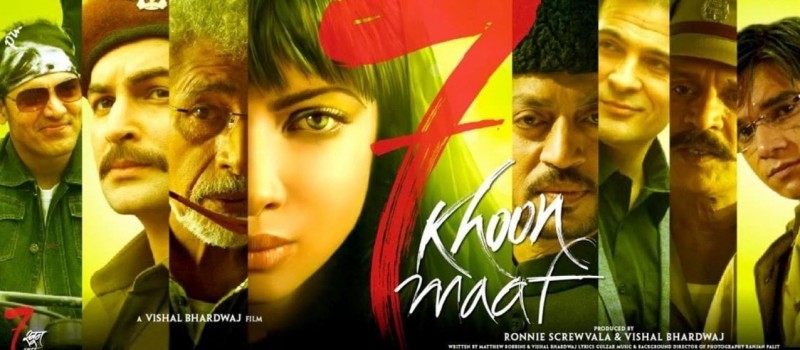
In the world of film, titles are crucial in shaping audience expectations and setting the tone for a film. They are more than just labels; they are essential components of a film's identity. Finding the perfect title for a film can often be as interesting as the story itself. One such intriguing journey was that of the film originally known as "Seven," which later became "Ek Bataa Saat," and finally settled as "7 Khoon Maaf." This article delves into the fascinating evolution of this title, providing insights into the creative process as well as the importance of a name in the world of filmmaking.
The plot begins with the creation of the script for the film, which was written by Vishal Bhardwaj and Matthew Robbins. This dark and enigmatic story, adapted from Ruskin Bond's short story "Susanna's Seven Husbands," required a title that captured the essence of the story. The film's working title was initially "Seven." Although simple, this title alluded to the film's central theme: Susanna's seven failed marriages. As the project progressed, the filmmakers realised that a more distinct and culturally resonant title was required to connect with the Indian audience.
As the filmmakers considered a more appropriate title, they decided to incorporate an element of Indianness into the name. The end result was "Ek Bataa Saat," which translates to "One Plus Seven" in English. This title not only kept the numerical reference to the seven husbands, but it also incorporated an element of Indian culture by using the Hindi word "Ek" (one).
"Ek Bataa Saat" hinted at the film's unique blend of Indian and Western influences. It served as a link between the source material by Ruskin Bond, which was set in a colonial Indian setting, and the film's contemporary, darkly whimsical narrative. Furthermore, it added an enigmatic touch, inviting audiences to investigate the arithmetic of Susanna's life and relationships. However, as production progressed, the creative team realised that this title might not fully capture the film's complexity and intrigue.
As the film approached completion, it became clear that a more evocative and immersive title was required to reflect Susanna's dark and mysterious journey, as portrayed by the brilliant Priyanka Chopra. This resulted in the final transformation, and the film was renamed "7 Khoon Maaf."
The phrase "7 Khoon Maaf" means "Seven Murders Forgiven" in English. This title captures the essence of the film's plot, in which Susanna becomes involved in a series of murders due to her mysterious past and desires. The use of "Khoon" (murder) rather than "Bataa" (plus) in the title adds a significant layer of intrigue and darkness. It represents not only the number of marriages, but also the number of murders committed by Susanna. Furthermore, the word "Maaf" (forgiven) alludes to Susanna's absolution-seeking nature, adding depth to the story.
The change to "7 Khoon Maaf" also signalled a move towards a more marketable and intriguing title. It struck a chord with the Indian audience, who were drawn to the mystery surrounding Susanna's character and her string of murders. The use of the number "seven" and the word "khoon" (murder) in the title ensured that the film's central themes were prominently highlighted, inviting audiences to delve into Susanna's dark, macabre world.
The evolution of the film's title from "Seven" to "Ek Bataa Saat" to "7 Khoon Maaf" emphasises the importance of titles in filmmaking. A title is more than just a label; it is a powerful tool for shaping audience expectations, conveying the essence of the film, and drawing viewers into the story. In the case of "7 Khoon Maaf," each title iteration reflected the filmmakers' shifting creative vision and the need to connect with the audience on a deeper level.
Furthermore, a well-crafted title can be used as a marketing asset. "7 Khoon Maaf" was more than just a name; it was a brand. It sparked interest and anticipation, making it an important part of the film's marketing campaign. It became a topic of discussion among filmgoers, adding to the film's pre-release buzz.
In the world of film, a film's title is much more than just a label. It is a reflection of the film's essence and an important component of its marketing strategy. The journey to find the perfect title for a film can be complicated and intriguing, as demonstrated by the transformation of "Seven" to "Ek Bataa Saat" and then to "7 Khoon Maaf." Each title iteration represented a different aspect of the film's narrative, and the final title, "7 Khoon Maaf," encapsulated Susanna's dark and enigmatic journey in life.
This evolution of the title serves as a reminder of the importance of titles in filmmaking. They should not be chosen lightly, but rather carefully crafted to resonate with the audience, convey the essence of the film, and add to its overall impact. In the case of "7 Khoon Maaf," the title was crucial in drawing audiences into the twisted and mysterious world of Susanna's seven husbands and her quest for redemption.
Shah Rukh Khan's Most Daring Dance Moment
"Dil Se..." Parade Scenes from India's 50th Independence Anniversary